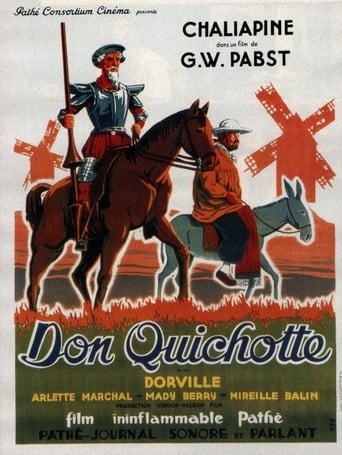Pluskylang
Great Film overall
Intcatinfo
A Masterpiece!
Nessieldwi
Very interesting film. Was caught on the premise when seeing the trailer but unsure as to what the outcome would be for the showing. As it turns out, it was a very good film.
SeeQuant
Blending excellent reporting and strong storytelling, this is a disturbing film truly stranger than fiction
cstotlar-1
Any excuse to hear Chaliapin sing is worth the listen and the watch. Also, it was great pleasure to see Pabst take on such a task in English. His camera never missed a beat and the scenery was magnificent. There are the things to object about as brought up by sever reviewers. It's true that Chaliapin's English was not good. He probably learned his lines phonetically. I've coached several singers in my time and it does sound like that. The music, by Jacques Ibert. was really quite good throughout and the players around Quixote himself were truly fine. This is a film for the history books - Pabst meets Chaliapin meets Ibert meet Cervantes meet the English language. They all win, but we do have to listen very carefully to the English. It is on the border of comprehension at times.
MartinHafer
There are two reasons why I chose to watch this film. First, it was in the public domain, so it was free to watch (a definite plus) and second it was directed by the famous German director, G. W. Pabst. Well, despite this, I just did not enjoy the film. One of the main problems was the casting of the main character. Feodor Chaliapin Sr. was an excellent operatic type of singer from Russia. And, while I'll freely admit that he had a lovely voice, the guy was all wrong as Quixote. His accent was VERY strong and it sounded as if he really didn't know English but was doing his lines phonetically. It just seemed weird to have have this sort of accent coming out of a guy who was supposed to be Spanish. Second, instead of the normal version of the Cervantes book, this a musical where again and again Chaliapin would break into song for absolutely no reason--and the songs just didn't fit the film. It was as if his performance was important but the plot wasn't--why else would they put this guy in the lead? So what's the rest of the English language version like? Well, the acting was pretty good--even if the actors were often very English. The sets looked nice and the acting was good. But because of the musical nature of the film, I just can't recommend it to anyone--as who would like this sort of film? It certainly hasn't aged well and I can see why it's a rather obscure public domain film.
psteier
I saw the New York Museum of Modern Art's print (the English language version). Only Chaliapin does much singing, but the music and lyrics are not much and I suggest you listen to his recordings to judge his singing. His acting seems very much staged.George Robey is very good as Sancho Panza (Don Quixote's servant), playing him as a Music Hall character. The scene with the traveling players at an inn is also interesting and fun.
Albert Sanchez Moreno
(This is a review of the VHS version)G.W.Pabst's film version of "Don Quixote", originally filmed in three languages, but with the same leading actor, may not please all lovers of the great Cervantes novel, but it makes a fascinating document for music lovers and opera buffs. Although not based at all on the Jules Massenet opera in which he sang the title role, this is the only chance to see and hear the great Russian basso Fyodor Chaliapin in one of his greatest roles.Chaliapin revolutionized the art of opera acting, and if he had wanted to, could have been an equally effective non-singing actor, although his English is heavily accented and he tends to declaim rather than just speak. His singing voice in this film is probably not what it once was, but he is so charismatic that he holds the audience riveted.(You may squirm through some of the songs, though - this isn't Massenet's opera, or "Man of La Mancha", for that matter.) The supporting cast is quite good in both English and French versions (I haven't seen the German one), and Chaliapin himself speaks and sings better French than English. The photography is beautiful, although this really isn't Spain,and the windmill sequence is a flabbergasting accomplishment for 1933. You may like a little more emotional involvement in your movies, though.Be warned - the French version (on the videocassette, not the DVD) has no subtitles - they assume you've already seen it in English since they both come in the same package.

